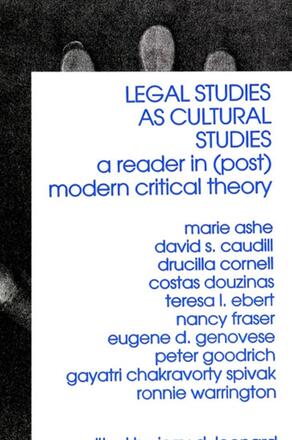
Legal Studies as Cultural Studies
A Reader in (Post)Modern Critical Theory
Alternative formats available from:
Essays by noted theorists such as Drucilla Cornell, Nancy Fraser, Peter Goodrich, and Gayatri Spivak provide a bridge between critical cultural studies in the humanities and the Critical Legal Studies movement demonstrating the transdisciplinary nature of both fields.
Description
This book is an inaugural integration of Contemporary Cultural Studies and Critical Legal Studies that sets the question of "justice" at the fore of postmodern critical theory. Opening with introductory-level discussions of key theoretical models in postmodern thought, the collection culminates in a series of radical critiques of existing modes of cultural and legal theory. Contributors to this volume include David S. Caudill, Marie Ashe, Gayatri Chakravorty Spivak, Nancy Fraser, Costas Douzinas and Ronnie Warrington, Drucilla Cornell, Eugene D. Genovese, Peter Goodrich, Teresa L. Ebert, and Jerry D. Leonard.
Jerry D. Leonard received his Juris Doctorate from the Syracuse University College of Law and is currently a doctoral candidate in the Department of English and Comparative Literature at the University of Wisconsin-Milwaukee. His writings have appeared in College Literature, Legal Studies Forum, Discourse, Law and Critique, Textual Practice, and other journals.
Reviews
"I am enthusiastic about this project. There are anthologies that address the intersections of legal studies with other fields, but none where the range and comprehensiveness of the essays focus major political issues in anything like the same way. " — Evan Watkins, University of Washington
"In a period when a succession of predictably organized, arranged, and conceived 'readers' are coming out almost daily, it is encouraging to see the kind of thoughtful and productive boundary-work Leonard has done here. Of all the anthologies he might have undertaken, nothing could be more urgent than one that pressures the unarticulated assumptions behind juridical practices—that is, those practices that promote and legitimate what is accepted as social justice at this historical moment. The persistent question that looms behind his project is whether there is or can ever be any such thing as 'universal' and 'objective' justice. " — Donald Morton, editor of Queer Theory: A Lesbian and Gay Cultural Studies Reader